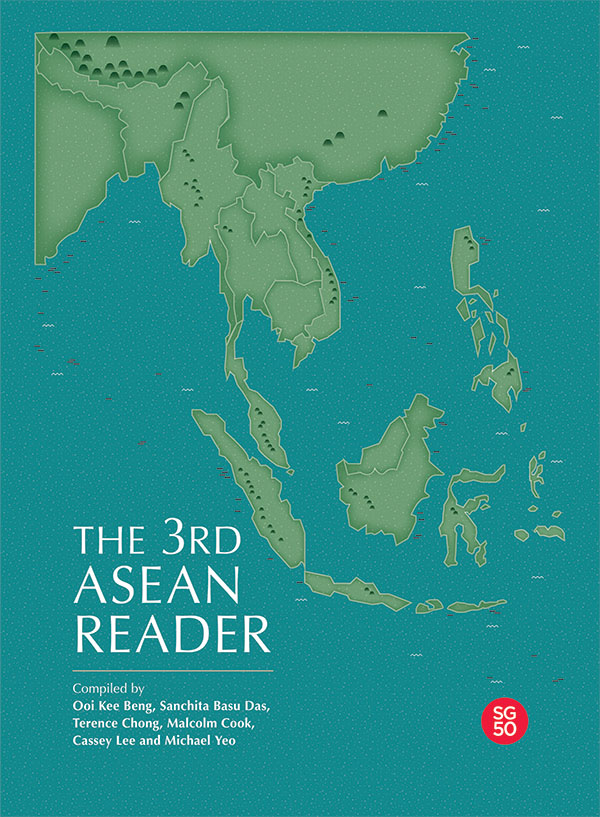Book contents
- Frontmatter
- Contents
- Preface
- Forewords to the First and Second ASEAN Reader: ASEAN: Conception and Evolution
- Forewords to the First and Second ASEAN Reader: ASEAN: The Way Ahead
- Forewords to the First and Second ASEAN Reader: New Challenges for ASEAN
- SECTION I ASEAN: THE LONG VIEW
- SECTION II COUNTRY ANALYSES
- SECTION III COMPARATIVE ANALYSES OF THE REGION
- Southeast Asian Societies
- The Southeast Asian Economy
- Southeast Asian Politics
- SECTION IV INTERNATIONAL DEVELOPMENTS
- SECTION V INSTITUTIONS OF ASEAN
- SECTION VI ASSESSING ASEAN'S INTERNAL POLICIES
- ASEAN Political Security Community
- ASEAN Economic Community
- ASEAN Socio-Cultural Community
- SECTION VII ASSESSING ASEAN'S EXTERNAL INITIATIVES
- ASEAN Processes
- ASEAN's Major Power Relations
- 71 ASEAN's Adventures
- 72 Developing an Enduring Strategy for ASEAN
- 73 Non-Traditional Security in China-ASEAN Cooperation: The Institutionalization of Regional Security Cooperation and the Evolution of East Asian Regionalism
- 74 China-ASEAN FTA Changes ASEAN's Perspective on China
- 75 Japan's Trade Policy with Asia
- 76 Managing Integration in East Asia: Behind Border Issues in Japan-ASEAN Trade Agreements
- 77 Fortifying the Japan-ASEAN Strategic Partnership: Abe's Quest for Viable Hedging Policies
- 78 Prospects for Korean-Southeast Asian Relations
- 79 China's Two Silk Roads: Implications for Southeast Asia
- SECTION VIII SOUTHEAST ASIA: PERIPHERAL NO MORE
- Bibliography
- The Contributors
- The Compilers
71 - ASEAN's Adventures
from ASEAN's Major Power Relations
Published online by Cambridge University Press: 22 June 2017
- Frontmatter
- Contents
- Preface
- Forewords to the First and Second ASEAN Reader: ASEAN: Conception and Evolution
- Forewords to the First and Second ASEAN Reader: ASEAN: The Way Ahead
- Forewords to the First and Second ASEAN Reader: New Challenges for ASEAN
- SECTION I ASEAN: THE LONG VIEW
- SECTION II COUNTRY ANALYSES
- SECTION III COMPARATIVE ANALYSES OF THE REGION
- Southeast Asian Societies
- The Southeast Asian Economy
- Southeast Asian Politics
- SECTION IV INTERNATIONAL DEVELOPMENTS
- SECTION V INSTITUTIONS OF ASEAN
- SECTION VI ASSESSING ASEAN'S INTERNAL POLICIES
- ASEAN Political Security Community
- ASEAN Economic Community
- ASEAN Socio-Cultural Community
- SECTION VII ASSESSING ASEAN'S EXTERNAL INITIATIVES
- ASEAN Processes
- ASEAN's Major Power Relations
- 71 ASEAN's Adventures
- 72 Developing an Enduring Strategy for ASEAN
- 73 Non-Traditional Security in China-ASEAN Cooperation: The Institutionalization of Regional Security Cooperation and the Evolution of East Asian Regionalism
- 74 China-ASEAN FTA Changes ASEAN's Perspective on China
- 75 Japan's Trade Policy with Asia
- 76 Managing Integration in East Asia: Behind Border Issues in Japan-ASEAN Trade Agreements
- 77 Fortifying the Japan-ASEAN Strategic Partnership: Abe's Quest for Viable Hedging Policies
- 78 Prospects for Korean-Southeast Asian Relations
- 79 China's Two Silk Roads: Implications for Southeast Asia
- SECTION VIII SOUTHEAST ASIA: PERIPHERAL NO MORE
- Bibliography
- The Contributors
- The Compilers
Summary
The Association of Southeast Asian Nations (ASEAN) is not a major power in its own right; instead, the imperative of this collection of relatively small countries is to diversify its dependencies by engaging simultaneously with a range of great powers, not to exacerbate its dependence on only one great power. In particular, ASEAN's push for greater regional integration has been justified as a way to both retain and grant regional legitimacy to U.S. strategic involvement in the region, and to engage and incorporate China as a responsible regional power. The two strands are intrinsically linked: the engagement of China is built upon the reassurance of continued U.S. strategic commitment to the region. For instance, ASEAN's increasingly enthusiastic bilateral and multilateral engagement with China is underpinned both by its members’ existing relationships with the United States and their desire to use the “China card” to persuade Washington to deepen these relationships.
Despite this broad agreement, differences in strategic preferences must be expected from a grouping of ten diverse countries. ASEAN does not want to enter exclusively into a Chinese sphere of influence. At the same time, governments with significant Muslim populations, such as those in Indonesia and Malaysia, have faced domestic political pressures against identifying too closely with the U.S. “war on terror”; and most ASEAN leaders have also expressed concern with Washington's apparent obsession with counterterrorism at the expense of other issues such as economic development. The result is occasional tension, such as the row over participation in the East Asia Summit, inaugurated in 2005. Some ASEAN members, such as Malaysia, backed China's wish to limit the summit to strictly East Asian states. Yet, Japan, Singapore and Indonesia eventually prevailed in their insistence on including Australia and New Zealand as representatives of “Western,” or American, interests.
ASEAN is an aspiring major power in East Asia. The association continues to face many collective-action problems even as it moves toward formally institutionalizing its collective identity. Yet it does not pose a fundamental challenge to American dominance. Instead, one of its key aims is to ensure the continued deep strategic and economic involvement of the United States in the region as a means of diversifying its member states’ dependence on great powers.
- Type
- Chapter
- Information
- The 3rd ASEAN Reader , pp. 373 - 374Publisher: ISEAS–Yusof Ishak InstitutePrint publication year: 2015

